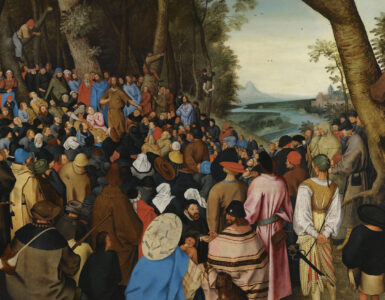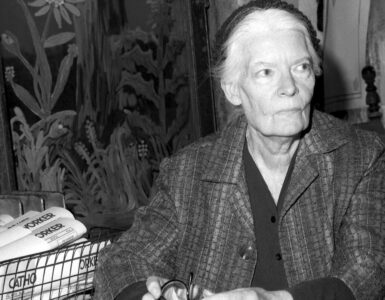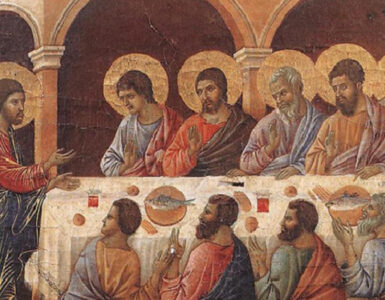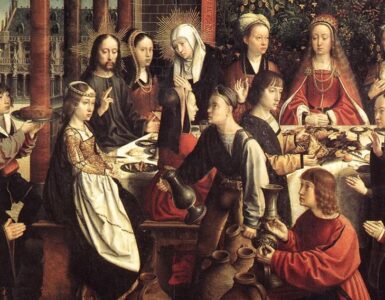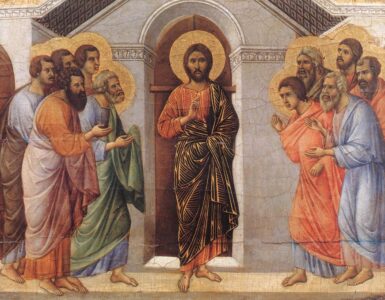Over 100 years ago, many Christian missionaries in China were in constant danger from gangs of outlaws, groups of rebel soldiers terrorizing the countryside, and other violent enemies of the Gospel. Four lay missionaries from Norway were in a certain Chinese town when they heard that a particularly vicious militia group was heading their way, killing everyone they met—even helpless women and children out in the fields. The missionaries gathered all their Christian converts together, reminded them that God promised to protect His people, and then led them in prayer; during the night they all tried to sleep as best they could. In the morning there was a pounding at the gate, and one of the missionaries, a woman named Marie, quickly answered it; it was a solitary soldier. He was surprised to see a smiling group of Christians, who graciously welcomed him and offered him something to eat and drink. Disarmed by their friendliness, the soldier gratefully sat down and, while eating and drinking, asked who they were; this gave the missionaries the chance to tell him about Christ. When the soldier left, he promised no one would harm or disturb them, and so it was: militia members were terrorizing the rest of the town, but the Christians were left alone.
In describing this encounter some time afterwards, Marie said, “It was unutterably marvelous to experience over and over again the peace Jesus spoke of which the world cannot give. In the midst of confusion and distress, one found oneself steadied by such wonderful restfulness of mind, that one did not recognize oneself” (The Book of Signs, Dr. David Jeremiah, p, 176). As these Christians discovered, Our Lord’s promise can be taken seriously, but only we can decide whether or not to believe in His words. Jesus is the Prince of Peace—and He gives His peace to those who are ready to receive it.
Because of original sin, life on earth is more difficult and challenging than God had intended; even our sincere efforts to grow in grace and come closer to Him can be marked by misunderstanding and confusion. Some of the early Christians mistakenly believed that all Gentile, or non-Jewish converts, to Christianity had to conform to the various Jewish religious rules and rituals. However, we see in the Acts of the Apostles (15:1-2, 22-29) that the early Church ruled that such a thing was not necessary; the apostles wanted to preserve and protect the spiritual peace of the new Christians by requiring as little of them as possible. Christianity is meant to be a religion of joy and peace and good news, not unnecessarily burdensome rules and regulations; we will reach the glorious Kingdom of Heaven—as described in the Book of Revelation (21:10-14, 22-23)—not by giving into fear and worry, but by trusting completely in Jesus. He tells us in the Gospel of John (14:23-29)l that if we love Him, we will obey Him, and that in doing so, we will find true and lasting peace. Our Lord also promises that through Him, we know God Himself; moreover, the Father and the Son will together send the Holy Spirit to teach us and guide us. For this reason, Jesus commands us, “Do not let your hearts be troubled or afraid”—for no matter what happens, His grace will sustain us, and even help us find happiness and peace in our afflictions, all the while preparing us for the joys of eternal life.
There was once a competition in which a number of talented artists were asked to paint a picture representing “peace.” Most of the entries depicted beautiful pastoral scenes, including clean beaches and calm waters, or fields and meadows under a friendly sun and gently-moving clouds, or streams of pure water lazily flowing through majestic forests. However, the winning entry showed a violent storm on a dark and forbidding night, with a heavy rain falling and lightning visible in the distance. A small corner of the painting showed a small bird, tucked away under the shelter of some overhanging rocks, peacefully sitting on its nest and oblivious to the storm raging around it (Michael P. Green, 1500 Illustrations for Biblical Preaching, p. 260).
This is the type of peace Jesus offers us: not a life free of all worry, suffering, or distress, but one in which, in the depths of our heart, we know that in the end everything will somehow be all right. This promise makes no sense from a worldly perspective. Non-believers search for happiness in wealth and material possessions, power and status, and leisure and pleasure—and when these things fail them, as they inevitably do, they are ill-equipped to cope with misfortune, failure, alienation, fear, loneliness, boredom, and spiritual emptiness. Jesus doesn’t want that to happen to any of us—but if we are to receive His peace, a true and lasting peace unknown to and unavailable from this world, our hearts must be prepared for it.
This means, first of all, remembering that our true home is Heaven, and that everything we own or achieve in this world is temporary and will pass away, and that every sacrifice or cross we’re now called to bear will come to an end. Life can take on a much different meaning or value if we see it as a necessary preparation for a joyful eternity. Secondly, if we wish to experience the peace of Christ, we must show genuine concern for those around us. God’s grace is not something we can keep to ourselves; it must be shared—whether by encouraging and supporting our fellow believers, or by witnessing to non-believers in Christ by our words and example. There are many people in today’s world lacking a sense of purpose and hope; if we can attract them to Jesus by our words and deeds, the Lord will be greatly pleased with us, and our own joy will be increased. Lastly, to share in Our Lord’s peace, we must learn—and re-learn as many times as necessary—the vitally-important lesson that God is in charge, and that He truly knows what’s best for us. Our Heavenly Father sees the big picture, and arranges all things for the well-being of His people. We have the freedom to ignore or reject His plan for us, but if we do, we’ll only end up hurting ourselves—perhaps, tragically, for all eternity. If instead, we are wise enough and humble enough to embrace God’s will, whatever it may be, we will discover and rest in a true peace that cannot be taken from us.
Our world is often frightening and confusing, and oftentimes dangerous and violent; it promotes false and empty values in order to lead us astray, while denigrating and opposing all that enriches and ennobles our God-given human nature. Society seeks to make us so busy and self-centered, and so unfocused and self-indulgent, that we fail to realize we’re spiritually empty and lost. Jesus offers us something infinitely better, and bestows through His Church all the spiritual resources and treasures needed to become fully alive. As we prepare for the great celebration of Pentecost, let us open our hearts as fully as we can to the Gifts of the Holy Spirit—for only in this way can we be sure of receiving and living in that peace which is our birthright, and which Christ alone can give.




